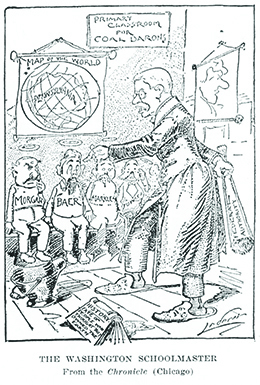| << Chapter < Page | Chapter >> Page > |
Although Roosevelt enjoyed the nickname “the Trustbuster,” he did not consider all trusts dangerous to the public welfare. The “good trusts,” Roosevelt reasoned, used their power in the marketplace and economies of scale to deliver goods and services to customers more cheaply. For example, he allowed Morgan’s U.S. Steel Corporation to continue its operations and let it take over smaller steel companies. At the same time, Roosevelt used the presidency as a “bully pulpit” to publicly denounce “bad trusts”—those corporations that exploited their market positions for short-term gains—before he ordered prosecutions by the Justice Department. In total, Roosevelt initiated over two dozen successful anti-trust suits, more than any president before him.
Roosevelt also showed in other contexts that he dared to face the power of corporations. When an anthracite coal strike gripped the nation for much of the year in 1902, Roosevelt directly intervened in the dispute and invited both sides to the White House to negotiate a deal that included minor wage increases and a slight improvement in working hours. For Roosevelt, his intervention in the matter symbolized his belief that the federal government should adopt a more proactive role and serve as a steward of all Americans ( [link] ). This stood in contrast to his predecessors, who had time and again bolstered industrialists in their fight against workers’ rights with the deployment of federal troops.

Roosevelt won his second term in 1904 with an overwhelming 57 percent of the popular vote. After the election, he moved quickly to enact his own brand of Progressivism, which he called a Square Deal for the American people. Early in his second term, Roosevelt read muckraker Upton Sinclair’s 1905 novel and exposé on the meatpacking industry, The Jungle . Although Roosevelt initially questioned the book due to Sinclair’s professed Socialist leanings, a subsequent presidential commission investigated the industry and corroborated the deplorable conditions under which Chicago’s meatpackers processed meats for American consumers. Alarmed by the results and under pressure from an outraged public disgusted with the revelations, Roosevelt moved quickly to protect public health. He urged the passage of two laws to do so. The first, the Meat Inspection Act of 1906, established a system of government inspection for meat products, including grading the meat based on its quality. This standard was also used for imported meats. The second was the Pure Food and Drug Act of 1906, which required labels on all food and drug products that clearly stated the materials in the product. The law also prohibited any “adulterated” products, a measure aimed at some specific, unhealthy food preservatives. For Sinclair, this outcome was a disappointment nonetheless, since he had sought to draw attention to the plight of workers in the slaughterhouses, not the poor quality of the meat products. “I aimed at the public’s heart, and by accident I hit it in the stomach,” he concluded with frustration.

Notification Switch
Would you like to follow the 'U.s. history' conversation and receive update notifications?